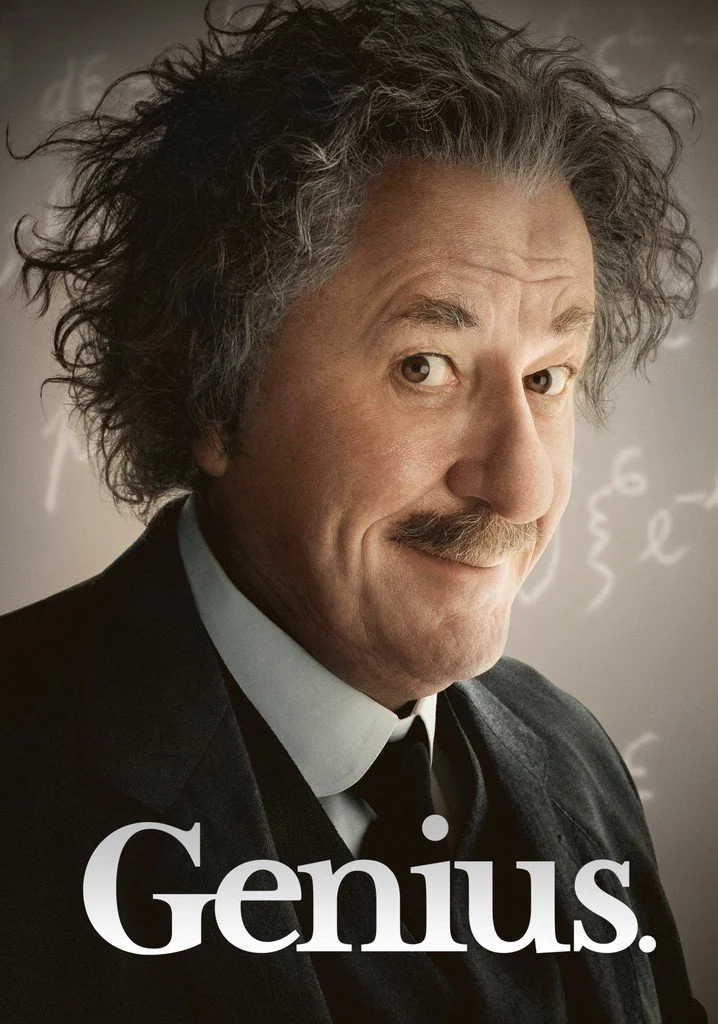Review: Genius Season 1 (2017) – A Portrait of Albert Einstein
A good portion of my time spent watching TV entertainment is on the topics of science, nature and historical subjects. Kati and I have been watching PBS Nature for 25 years and we’ve seen all of Ken Burn’s documentaries from the Civil War through Baseball. And who doesn’t love “The Crown”? Netflix and Prime Video have lots of interesting documentaries and historical fiction spanning topics from the emergence of early humans, though the Crusades and the Renaissance thru the Vietnam War.
There is one show that made such an impression on me that I wrote songs on the topics. More on that later. The National Geographic’s Genius series made its Season 1 debut in 2017 with a mesmerizing deep dive into the life and mind of Albert Einstein, the iconic physicist who revolutionized our understanding of the universe. Starring the inimitable Geoffrey Rush as the older Einstein and Johnny Flynn as the younger version, the series is a masterful blend of biography, drama, and science.
The first 10-episode season of Genius employs a dual narrative, interweaving Einstein’s tumultuous early years with his later life as a world-famous scientist grappling with personal and political challenges. This structure creates a layered portrait of Einstein, showcasing not just his groundbreaking contributions to physics but also the complexities of his personal relationships, his struggles with authority, and his moral convictions.
Johnny Flynn brings a youthful energy to Einstein's early years, capturing the ambition and rebellious spirit that defined his ascent in the academic world. Geoffrey Rush, meanwhile, delivers a powerhouse performance as the elder Einstein, portraying a man grappling with fame, strained family ties, and the weight of his discoveries in an increasingly polarized world.
What sets Genius apart from a standard biographical series is its focus on Einstein’s humanity. His relationships with his wives, Mileva Marić (played with sensitivity by Samantha Colley) and Elsa Einstein (Emily Watson), are explored with nuance, revealing a man who was both brilliant and deeply flawed. The show doesn’t shy away from his failings as a husband and father, nor does it gloss over the prejudices and obstacles he faced as a Jewish scientist during the rise of fascism in Europe.
The series excels in making complex scientific ideas accessible to a general audience without oversimplifying them. Einstein's theories, including the development of his famous equation E=MC2, are presented in engaging, visually imaginative ways that help viewers grasp their significance. We get a glimpse into Einstein’s “thought experiments” (Gedankenexperiments) where he daydreams about his theories in illustrative ways that reveal their underlying principles from which he develops the mathematics to explain his theories to the world.
One of these was The Elevator Thought Experiment where he imagined being in a closed elevator. If the elevator is accelerating upward, you would feel a force like gravity. Alternatively, if the elevator is stationary in a gravitational field, you would feel the same force. This equivalence of acceleration and gravitational force led to the Equivalence Principle: gravity and acceleration are indistinguishable in a small region of spacetime. This principle became the foundation of General Relativity, describing gravity as the curvature of spacetime caused by mass and energy.
Einstein took this concept further with his Gravitational Freefall Thought Experiment where the same elevator goes into freefall at a high rate of speed so that the occupants are floating. Another example is an astronaut floating in outer space because he is essentially in freefall from earth. He concluded that gravity is not a force but the result of objects following straight paths in curved spacetime. This realization led to the development of the geometric interpretation of gravity in General Relativity.
At 16 years old, Einstein had his The Light Beam Chase Thought Experiment. He imagined chasing a beam of light at the speed of light. He wondered what the beam would look like from his perspective. Would the light wave appear stationary? Maxwell's equations suggest that light always moves at a constant speed of 186,000 miles per second, regardless of the observer's motion. This thought experiment helped Einstein realize the incompatibility between Newtonian mechanics and electromagnetism which led to the development of Special Relativity, which states that the speed of light is constant for all observers in a vacuum, and time and space are relative.
Even as we get a layman’s view into Einstein’s brilliant mind, the show never loses sight of the human drama underpinning his scientific achievements. When Einstein and his wife Elsa attempt to flee Germany after the rise of the Nazis, they face unexpected roadblocks and betrayal by people he thought were friends. When they finally moved to America, he became a much sought after professor at Princeton, but dangers abroad continued to be a threat to him and his former colleagues. When America dropped the atomic bomb on Japan to end WWII, Einstein and some of his colleagues had mixed feelings on how their research was used for such destructive purposes. In his twilight years, he took on the role of world citizen, opining on a wide variety of topics people asked him about. You will find no shortage of insightful quotes by the man on the web. Here are a few of my faves:
The only thing more dangerous than ignorance is arrogance
Failure is success in progress
Don't listen to the person who has the answers; listen to the person who has the questions.
If you can't explain it simply, you don't understand it well enough.
The more I study science, the more I believe in God.
The visual style of Genius is cinematic, with beautiful period-accurate costumes and sets that immerse viewers in the early 20th century. The direction by Ron Howard and others is crisp and engaging, with moments of creative flair that elevate the storytelling. The score, composed by Lorne Balfe, complements the series perfectly, blending emotion and intellect in equal measure.
While the series is compelling, it occasionally succumbs to biopic tropes, and the pacing can feel uneven at times. Some moments in Einstein's personal life might feel overly dramatized, though they serve the narrative well in creating a relatable figure.
Season 1 of Genius is a triumph, offering a profound and gripping exploration of one of history’s greatest minds. Geoffrey Rush’s masterful portrayal, combined with the series’ thoughtful storytelling and stunning production values, makes it a must-watch for fans of historical drama and science alike. National Geographic not only entertains but also educates, reminding us that even the most brilliant among us are deeply human. Whether you’re a science enthusiast, a history buff, or simply someone who appreciates well-crafted drama, Genius Season 1 is a series that will leave a lasting impression.
Now as I alluded to earlier, I was so taken by the Genius: Einstein season that I wrote a song about it called Time Travel. I watched the show for the first time in 2017 but also a second time in 2022 and the idea for the song came to me. Einstein's Special Relativity theory showed that time is not absolute; it passes at different rates for observers moving relative to each other. A person traveling near the speed of light would experience time more slowly than someone stationary (time dilation). This creates a form of "time travel" to the future because the traveler would age less than those left behind. Einstein viewed time as a dimension similar to space, woven into the fabric of spacetime. His famous quote: “The distinction between past, present, and future is only a stubbornly persistent illusion,”
suggests that he saw time as an integral part of the universe rather than a fixed progression.
Appropriately inspired by Einstein and quantum mechanics that were derived from his work, I wrote the following song:
Been here
A thousand years ago
I see you standing there
In the corner of my Eye
Don’t steer
Past becomes the Now
The Wheel of Time
In an Endless Sky
Unplug
From fake reality
Living in the Matrix
Will steal your soul away
Spend time
With the ones you love.
Touch, smell, taste
Before it’s too late.
Feel Time
It’s like a River
Flowing in a Circle
Continuously.
Future and Past
Push into the Present
A Quantum Retro Causality
Small things that ripple through time
Cause bigger things further down the line
Life is a pebble thrown into a pond
Radiating waves, the future lives on
Unwind
Rest your tired soul
Take time to make time
And lay here with me
Sunshine
Will melt our blues away
The sweet do nothing
It’s a fine place to be
If you want to hear the song, Time Travel, just click this link to my Soundcloud site. The bottom line is that Genius: Einstein Season 1 is great and highly recommended. You can find it on Prime Video. I loved Einstein so much that I watched Season 2: Picasso which was also brilliant, and I wrote a song about that as well. But that’s a story for another day!

